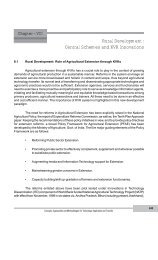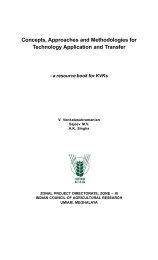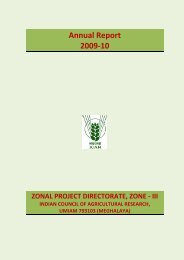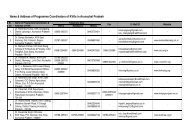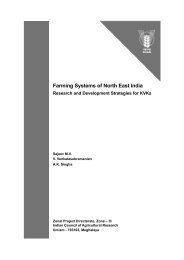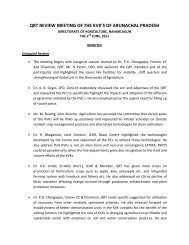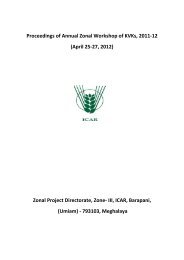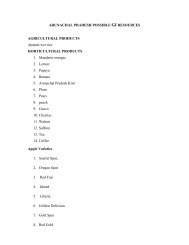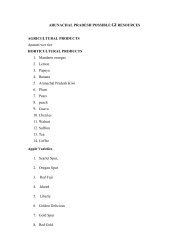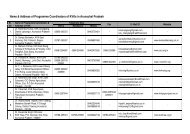Training Methodology for KVK Scientists - ICAR, Zonal Project ...
Training Methodology for KVK Scientists - ICAR, Zonal Project ...
Training Methodology for KVK Scientists - ICAR, Zonal Project ...
You also want an ePaper? Increase the reach of your titles
YUMPU automatically turns print PDFs into web optimized ePapers that Google loves.
V<br />
V. Venkatasubramanian, Sajeev, M.V. & A.K. Singha.<br />
14. Trainers’ / teachers’ high expectations from learners and openness to examine own<br />
needs.<br />
15. Trainers’ / teachers’ competence.<br />
5.9 <strong>Training</strong> Need Assessment<br />
Need is the gap between what is And what ought to be <strong>Training</strong> need refers to the gap<br />
between “what is” and “what should be” in terms of the trainees knowledge, skills, attitude and the<br />
behaviour in a given situation and time. It is important to analyse the training needs <strong>for</strong> designing an<br />
effective training programme 1 . Four major approaches <strong>for</strong> the training needs identification have<br />
been proposed by different authors. They are as follows:<br />
5.9.1 Per<strong>for</strong>mance Appraisal<br />
In this method the actual per<strong>for</strong>mance of the trainee in a given situation is compared with<br />
that of the ideal or expected per<strong>for</strong>mance. It can be evaluated through direct observation, evaluation<br />
of per<strong>for</strong>mance records <strong>for</strong> a period of time and the individuals’ self appraisal about their per<strong>for</strong>mance<br />
compared with their actual output. Through this method one can link between knowledge and skill<br />
requirements with their job per<strong>for</strong>mance.<br />
5.9.2 Task Analysis<br />
A detailed analysis of the task per<strong>for</strong>med by an individual as per the standards and job chart<br />
is to be done. The data pertaining to the knowledge and skill requirement <strong>for</strong> the task, their<br />
per<strong>for</strong>mance in the actual situation need to be collected through interviews, case methods, and<br />
direct observation techniques. A detailed interview schedule need to be prepared <strong>for</strong> the assessment<br />
of training needs based on the task analysis <strong>for</strong> collection of relevant data. The schedule contains<br />
the details of different tasks and the frequency of per<strong>for</strong>mance of each task. The details such as level<br />
of importance and level of competency are obtained in a differential rating manner <strong>for</strong> each task. The<br />
common methods used <strong>for</strong> task analysis are interview, questionnaire, case method and observation.<br />
The task analysis is a process by which one can know the different elements or sub-tasks which are<br />
critical <strong>for</strong> its per<strong>for</strong>mance.<br />
5.9.3 Survey method<br />
It is one of the most frequently used methods. The need analysis is done based upon the<br />
individual perception and opinion of the individuals <strong>for</strong> whom the training programme is organized.<br />
1<br />
Please refer Chapter - XII <strong>for</strong> model schedules on training need analysis developed by <strong>Zonal</strong> <strong>Project</strong> Directorate, Zone<br />
– III <strong>for</strong> farmers and <strong>KVK</strong> personnel separately.<br />
110<br />
Concepts, Approaches and Methodologies <strong>for</strong> Technology Application and Transfer



